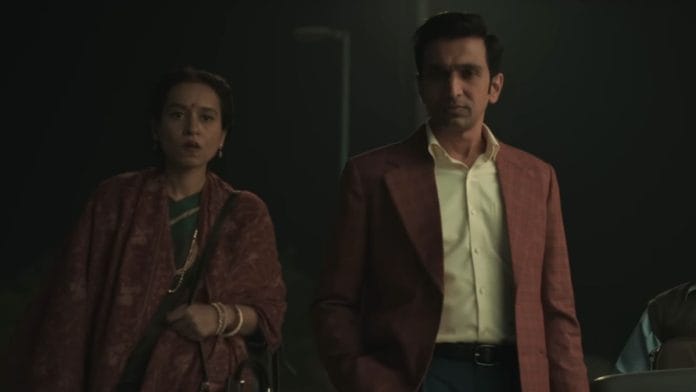New Delhi: In Saare Jahan Se Accha, the spy thriller releasing 13 August on Netflix, Gaurav Shukla has chosen to shun over-the-top patriotism and hypernationalism and focus on the personal and emotional struggles of the spies who often spend their lives in hostile environments.
“While the end goal is to keep India safe, the series makes you look beyond borders and uniforms. Because in the end, even your worst enemy is also a human,” actor Pratik Gandhi told ThePrint during an interaction at The Leela Palace recently.
In the six-episode series, Gandhi plays R&AW agent Vishnu Shankar, who embarks on a high-risk mission to stop Pakistan from developing a nuclear weapon.
“If you remove the names of the countries, what remains are just human stories. And, that’s what we are narrating. In the end, they (both Indian and Pakistani spies) are just individuals willing to kill or die for their country,” he said.
His co-star Sunny Hinduja of Aspirants (2021) fame also highlighted that the series isn’t centred on the India-Pakistan rivalry, but rather on the emotional intricacies of life as a spy. It will make the audience empathise with the intelligence agencies. Hinduja portrays Pakistani spy Murtuza Malik in Saare Jahan Se Accha.
Hinduja, who has previously played a Pakistani spy in a documentary drama Adrishya (2021), added, “If at all the series will move the public, it will give them meat to think over at what all spies put at stake.”
Also read: OTT tongue exposed Indians to small Hindustans. Language purity taking backseat
Not another James Bond
Saare Jahan Se Accha is releasing at a time when conflicts are unfolding across the globe, including on India’s borders.
According to Gandhi, the release of the film at this juncture is “extremely relevant” because viewers must understand how the world of spies actually works.
“Their failures get converted into wars. If they succeed, they can avoid wars. And not just India or Pakistan, world over there are so many wars happening. You can actually avoid it by operating from a small office,” said Gandhi, whose earliest memory of a spy in popular culture was James Bond.
He recalls how James Bond, with his crisp suits, effortless swag, and presence, would always be the centre of attention at parties, contrary to how real spies operate.
“We’re trying to portray that authenticity, the high stakes they face, the moral dilemmas, the psychological pressure,” said Gandhi.
“And it’s not limited to just India and Pakistan; the narrative touches on spies from other countries as well. It goes far deeper than the usual surface-level portrayal of a spy’s emotions.”
As outsiders…
Saare Jahan Se Accha marks the first collaboration between Gandhi and Hinduja. Though their individual journeys in the industry have been quite distinct, there are still several similarities.
Both hail from tier-2 cities, come from non-film backgrounds, and have spent nearly two decades in the industry before achieving widespread recognition, much of which came through OTT platforms.
Reflecting on his 20-year-long wait to “make it,” Hinduja admitted that the journey tested his patience, but ultimately described it as “necessary.”
“If I hadn’t faced that struggle, I wouldn’t be able to hold on to what I have today,” he said.
A statement from Naseeruddin Shah during an interview gave hope to Hinduja.
“Shah sahab said, ‘10 saal toh samjhne mein lag jaate hain craft ko. Actor kab banoge, pata nahi (It takes ten years just to understand the craft, when you’ll become an actor, no one knows)’,” the actor recalled.
Hinduja also said that he intentionally chose to take a slower and rigorous path, undergoing proper training first, and wanting to be fully prepared for the long journey ahead. But, facing setbacks for almost 20 years did take a toll on him.
“But my passion was always bigger than my disappointment,” he added.
Gandhi, on the other hand, came from a family of teachers in Surat and had never considered acting as a viable career path. In 2004, he moved to Mumbai with the dream of carving out a place in mainstream cinema, a dream that took nearly 16 years to materialise. In 2020, he got his big break as the titular character in Scam 1992: The Harshad Mehta Story.
“During those years, I ventured into multiple things within the performing arts. I worked in a couple of Gujarati films and also worked as an engineer to make ends meet,” he said.
“For me, the real goal was earning the trust of directors to become their first choice. And, I am grateful to have that moment now.”
Also read: Working at Rikers Island prison taught Tillotama Shome more than acting school
AI in filmmaking
The re-release of Aanand L Rai’s 2013 film Raanjhanaa has raised existential questions on the future of filmmaking in the industry. Both Gandhi and Hinduja backed the director, calling the AI-assisted happy ending a “creative violation.”
The Tamil version of the 2013 romantic drama Raanjhanaa, starring Dhanush and Sonam Kapoor, was re-released in theatres by production house Eros International on 1 August with a new AI-assisted happy ending.
Gandhi expressed concern over such alterations.
“If I say ‘yes’ to a particular script and if you change anything after, my decision might have been different,” he noted.
Hinduja too criticised it. According to him, if AI was going to be used, the entire film might as well have been created that way. He urged actors and filmmakers to treat the incident as a wake-up call.
“It’s important to find a way to put a clause in the contract to prevent such a situation in the future,” he added.
(Edited by Theres Sudeep)






